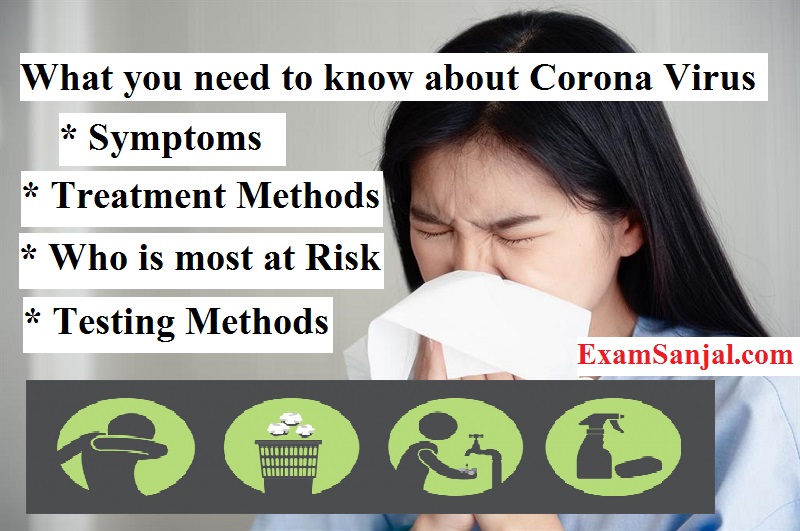COVID-19 is a respiratory illness caused by a new virus. Symptoms include fever, coughing, sore throat and shortness of breath. The virus can spread from person to person, but good hygiene can prevent infection. Find out who is at risk and what you should do if you think you have COVID-19.
Symptoms
Symptoms can range from mild illness to pneumonia. Some people will recover easily, and others may get very sick very quickly.

People with coronavirus may experience:
- fever
- flu-like symptoms such as coughing, sore throat and fatigue
- shortness of breath
If you think you have COVID-19
If you are sick and think you have symptoms of COVID-19, seek medical attention. If you want to talk to someone about your symptoms first, call the Coronavirus Health Information Line for advice.
How to seek medical attention
To seek medical help from a doctor or hospital, call ahead of time to book an appointment.
You will be asked to take precautions when you attend for treatment. Follow the instructions you are given.
If you have a mask, wear it to protect others. Stay at least 1.5 metres away from other people. Cover your coughs or sneezes with your elbow.
Tell the doctor about:
- your symptoms
- any travel history
- any recent contact with someone who has COVID-19
Getting tested
Your doctor will tell you if you should be tested. They will arrange for the test.
You will only be tested if your doctor decides you meet the criteria:
- You have returned from overseas in the past 14 days and you develop respiratory illness with or without fever
- You have been in close contact with a confirmed COVID-19 case in the past 14 days and you develop respiratory illness with or without fever
- You have severe community-acquired pneumonia and there is no clear cause
- You are a healthcare worker who works directly with patients and you have a respiratory illness and a fever
After testing
It may take a few days for the test results to come back.
If you have serious symptoms you will be kept in hospital and isolated from other patients to prevent the virus spreading.
If your doctor says you are well enough to go home while you wait for your test results, you should:
- self-quarantine at home and do not attend work or school
- wash your hands often with soap and water
- cough and sneeze into your elbow
- avoid cooking for or caring for other members of your household
- wear the mask your doctor gives you if you cannot avoid close contact with other people
Treatment
There is no treatment for COVID-19, but medical care can treat most of the symptoms.
Antibiotics do not work on viruses.
If you need to self-isolate
If you have been diagnosed with COVID-19, you must stay at home to prevent it spreading to other people.
You might also be asked to stay at home if you may have been exposed to the virus.
Staying at home means you:
- do not go to public places such as work, school, shopping centres, childcare or university
- ask someone to get food and other necessities for you and leave them at your front door
- do not let visitors in — only people who usually live with you should be in your home
You do not need to wear a mask in your home. If you need to go out to seek medical attention, wear a surgical mask (if you have one) to protect others.
You should stay in touch by phone and on-line with your family and friends.
Who is most at risk
In most cases, the people most at risk of getting the virus are those who have:
- recently been in in a high risk country or region (mainland China, Iran, Italy or Korea)
- been in close contact with someone who has a confirmed case of COVID-19
Based on what we know about coronaviruses, those most at risk of serious infection are:
- people with compromised immune systems (such as people who have cancer)
- elderly people
- Aboriginal and Torres Strait Islander peoples (as they have higher rates of chronic illness)
- people with chronic medical conditions
- people in group residential settings
- people in detention facilities
How it spreads
The virus can spread from person to person through:
- close contact with an infectious person (including in the 24 hours before they started showing symptoms)
- contact with droplets from an infected person’s cough or sneeze
- touching objects or surfaces (like doorknobs or tables) that have cough or sneeze droplets from an infected person, and then touching your mouth or face
COVID-19 is a new disease, so there is no existing immunity in our community. This means that COVID-19 could spread widely and quickly.
Protect yourself and others
To prevent the spread of viruses, practise good hygiene and social distancing.
You should also follow our advice for travellers and advice for public gatherings and visits to vulnerable groups.
Good hygiene
Everyone must practise good hygiene to protect against infection and prevent the virus spreading.

Good hygiene includes:
- covering your coughs and sneezes with your elbow or a tissue
- disposing of tissues properly
- washing your hands often with soap and water, including before and after eating and after going to the toilet
- using alcohol-based hand sanitisers
- cleaning and disinfecting surfaces
- if you are sick, avoiding contact with others and staying more than 1.5 metres away from people
- cleaning and sanitising frequently used objects such as mobiles, keys and wallets
Read more about protective measures against coronavirus on the World Health Organization website.
If you have a confirmed case, you need to self-quarantine to prevent it spreading to other people.
Social distancing
One way to slow the spread of viruses is social distancing. For example:
- staying at home when you are unwell
- avoiding large public gatherings if they’re not essential
- keeping a distance of 1.5 metres between you and other people whenever possible
- minimising physical contact, especially with people at higher risk such as older people and people with existing health conditions
Find out more about social distancing and avoiding public gatherings and visits to vulnerable groups.
Surgical masks
Surgical masks in the community are only helpful in preventing people who have coronavirus disease from spreading it to others.
If you are well, you do not need to wear a surgical mask. There is little evidence that widespread use of surgical masks in healthy people prevents transmission in public.
Find out more in our fact sheet about the use of surgical masks.
Vaccination
There is no vaccine for COVID-19, but there is one for the flu.
You should get your flu shot when it’s available. Getting the flu and COVID-19 at the same time can make you very ill.
Scientists from around the world are working on developing a vaccine. The World Health Organisation believes this may be available within 18 months.
Support
Support is available if you are concerned about COVID-19 or are distressed because you are in self-quarantine or sick.
Visit the Head to Health website for:
- links to mental health online and phone support
- resources and services that can help if you’re experiencing mental health concerns or trying to support someone else
Resources
To find out more, see our English COVID-19 resources and translated COVID-19 resources.
Coronaviruses (CoV) are a large family of viruses that cause illness ranging from the common cold to more severe diseases such as Middle East Respiratory Syndrome (MERS-CoV) and Severe Acute Respiratory Syndrome (SARS-CoV).
Coronavirus disease (COVID-19) is a new strain that was discovered in 2019 and has not been previously identified in humans.
Coronaviruses are zoonotic, meaning they are transmitted between animals and people. Detailed investigations found that SARS-CoV was transmitted from civet cats to humans and MERS-CoV from dromedary camels to humans. Several known coronaviruses are circulating in animals that have not yet infected humans.
Common signs of infection include respiratory symptoms, fever, cough, shortness of breath and breathing difficulties. In more severe cases, infection can cause pneumonia, severe acute respiratory syndrome, kidney failure and even death.
Standard recommendations to prevent infection spread include regular hand washing, covering mouth and nose when coughing and sneezing, thoroughly cooking meat and eggs. Avoid close contact with anyone showing symptoms of respiratory illness such as coughing and sneezing.

